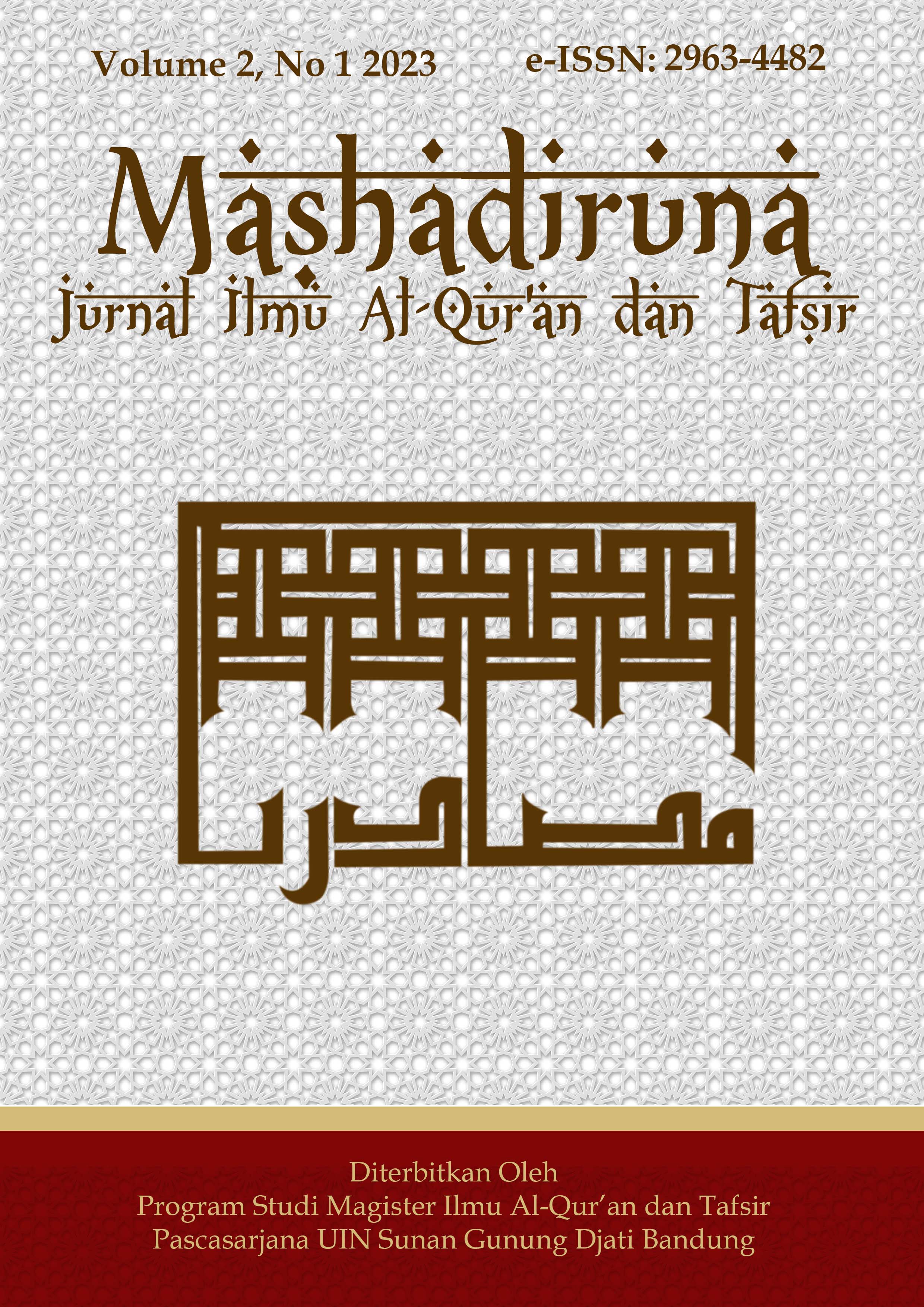Feminist Tafsir: Makiyyah and Madaniyyah's Significance for 'Ulumul Qur'an in the Thought of Husein Muhammad
DOI:
https://doi.org/10.15575/mjiat.v3i1.33874Keywords:
Makiyyah, Madaniyyah, 'Ulumul Qur'an, Husein MuhammadAbstract
The grand theory of makiyyah and madaniyyah according to classical scholars is seen from three aspects, namely time, place, and object of the speaker. However, Husein Muhammad perspektive makiyyah and madaniyyah from the aspect of time only. This view stems from Husayn's definition of the Qur'an as a guide that will always be relevant to human life. Through the Makiyyah and Madnaiyyah theories, he shows an interpretation that is not gender biased but has implications for the 'Ulumul Qur’an theory. This problem raises two questions about the concept of makiyyah and madaniyyah according to Husein Muhammad, and what are the implications of his views on the 'ulumul Qur'an. The results of this study indicate that Husein Muhammad has the view that makiyyah and madaniyyah are influenced by the social reality of Arab society. The Makiyyah verses show a universal meaning while the madaniyyah verses show a partikular meaning so that it has implications for the 'ulumul Qur'an aspect, namely the mansukh, muhkam, and mutasyabih texts.References
Adam, M. (2006). Ulum Al-Qur’an: Studi Perkembangan Pesantren al-Qur’an (Sebuah Pengantar Ulum Al-Qur’an). Bandung: Makrifat Media Utama.
Al-Farmawi, A. H. (2002). Metode Tafsir Maudhu’iy dan Cara Penerapannya, terj. Rosihon Anwar. Bandung: Pustaka Setia.
Anwar, R. (2013). ‘Ulumul Qur’an. Badung: Pustaka Setia.
Aá¹£-á¹£uyuá¹i, J. (n.d.). Al-Itqan fi ’Ulum Al-Qur’an. Kairo: Dar al-Turats al-Ta’lim wa al-Tarbiyah fi al-Islam.
As-Syatibi, A. I. (1975). Al-Muwafaqat fi ushul al-Syari’ah. Beirut Lebanon: Dar al-Ma’rifat.
Az-Zarkasyi, B. (1957). Al-Burhan fi Ulum Al-Qur’an. Dar Ihya Al-Kutub Al-Arabiyah.
Daud, S. (2010). Makkiyah dan Madaniyah: Teori Konvensional dan Kontemporer. Dialogia, 8(1), 1–13.
EQ, N. A., & Sartika, E. (2020). Tafsir Feminisme terhadap Makiyyah dan Madaniyyah. Retrieved from https://digilib.uinsgd.ac.id/32932/
Fadli, M. R. (2021). Memahami desain metode penelitian kualitatif. Humanika, 21(1), 33–54. https://doi.org/10.21831/hum.v21i1.38075
Hakim, L., & Putra, A. (2022). Signifikansi Makkiyah Madaniyah Dan Implikasinya Terhadap Penafsiran Al-Qur’an. RUSYDIAH: Jurnal Pemikiran Islam, 3(1), 95–113. https://doi.org/10.35961/rsd.v3i1.472
Husni, M. (2019). Studi Al-Qur’an: Teori Al Makkiyah dan Al Madaniyah. Al-Ibrah : Jurnal Pendidikan Dan Keilmuan Islam, 4(2), 68–84.
Lantong, M. B. K. (2018). Konsep Makkiyah dan Madaniyyah Dalam Al-Qur’an (Sebuah Analisis Historis-Filosofis). Potret Pemikiran, 20(1), 1–7. https://doi.org/10.30984/pp.v20i1.746
Mudzakir. (2019). Studi Ilmu-ilmu Al-Qur’an terjemahan Mabahits fi ’Ulum al-Qur’an. Bogor: Litera AntarNusa.
Muhammad, H. (2001). Fiqh Perempuan refleksi Kiyai atas Wacana Agama dan Gender. Yogyakarta: LKIS.
Muhammad, H. (2001). Ijtihad Kiyai Husein Upaya Membangun Keadilan Gender. Jakarta: Rahima.
Muhammad, H. (2004). Islam Agama Ramah Perempuan. Yogyakarta: LKiS.
Muhammad, H. (2007). Tafsir Alquran dalam perspektif perempuan†dalam modul kursis Islam dan Gender: Dauwroh Fiqih Perempuan. Cirebon: Fahmina Institut.
Muhammad, H. (2016). Perempuan Islam dan Negara Pergulatan Identitas dan Entitas. Yogyakarta: Qalam Nusantara.
Nahdliyyin, K. (2016). Tekstualitas Al-Qur’an. Yogyakarta: IRCiSoD.
Syu’bah, M. A. (1987). Al-Madkhal Li Dirasah al-Qur’an al-Karim. Riyadh: Dar Al-Liwa.
Tanjung, A. A. R. dan A. (2022). Makiyyah dan Madaniyyah. Jurnal Pendidikan Dan Konseling, 4, 1349–1358.
Zulaiha, E. (2018). Analisa Gender dan Prinsip Prinsip Penafsiran Husein Muhammad pada Ayat-Ayat Relasi Gender. Al-Bayan: Jurnal Studi Ilmu Al- Qur’an Dan Tafsir, 3(1), 1–11. https://doi.org/10.15575/al-bayan.v3i1.3125
Zulaiha, E., & Busro, B. (2020). Prinsip Liberalisme Dalam Metodologi Tafsir Feminis: Pembacaan Pada Karya Karya Husein Muhammad. Khazanah: Jurnal Studi Islam Dan Humaniora, 18(1), 25. https://doi.org/10.18592/khazanah.v18i1.3527
Downloads
Published
Issue
Section
License
Authors who publish with this journal agree to the following terms:
- Authors retain copyright and grant the journal right of first publication with the work simultaneously licensed under a Creative Commons Attribution License that allows others to share the work with an acknowledgment of the work's authorship and initial publication in this journal.
- Authors are able to enter into separate, additional contractual arrangements for the non-exclusive distribution of the journal's published version of the work (e.g., post it to an institutional repository or publish it in a book), with an acknowledgment of its initial publication in this journal.
- Authors are permitted and encouraged to post their work online (e.g., in institutional repositories or on their website) prior to and during the submission process, as it can lead to productive exchanges, as well as earlier and greater citation of published work (See The Effect of Open Access).
